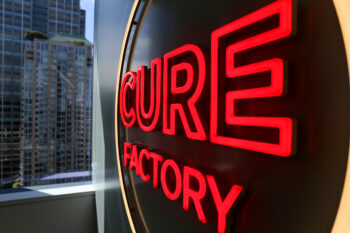
Seattle Children’s, an international leader in the effort to better treat cancer in children, teens and young adults by boosting the immune system with immunotherapy, has reached a new milestone by enrolling its 500th patient in its chimeric antigen receptor (CAR) T-cell immunotherapy clinical trials in 10 years.
T cells play a key role in fighting pathogens and regulating the immune system. Through a potentially game-changing experimental treatment called cancer immunotherapy, a patient’s own T cells are “reprogrammed” into CAR T cells that can hunt down and destroy cancer cells wherever they are hiding in the body.
Support from more than 24,000 donors in all 50 states and across 17 other countries has raised more than $123 million to date to move this research forward. Historically, only 4% of the federal cancer research budget was allocated to pediatric cancer. In 2021, advocacy efforts helped increase that percentage to 8%, but there is a significant need for additional funding and philanthropy in pediatric cancer research to help scientists advance this important work and open new trials sooner.
On the Pulse looks back at the remarkable stories of Seattle Children’s patients who fought and beat cancer over the last decade, and shares where they are today.
Pioneering research moves the needle on childhood cancer
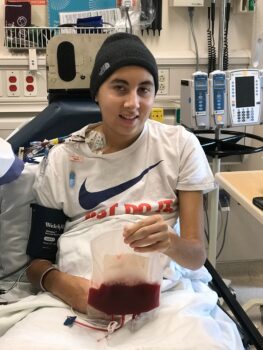
Jedd – Pediatric Leukemia Adoptive Therapy (PLAT-02) clinical trial
At just 14 years old, Jedd, of Tacoma, Wash. was diagnosed with acute lymphoblastic leukemia (ALL), while in high school. Soon after beginning chemotherapy, Jedd and his mom, Maryn, learned that his cancer was resistant to treatment.
The family connected with experts in Seattle Children’s Cancer and Blood Disorders Center and Seattle Children’s Therapeutics to enroll in a T-cell immunotherapy clinical trial, hopeful that it could be another possible option, when there were no others left.
“I remember it happening relatively fast, considering that I got diagnosed in late July and then underwent the T-cell therapy by early October,” recounted Jedd.
“Once I received my T cells back, it took longer for my cells to activate, but then I woke up early one morning at the Ronald McDonald house with a fever, and that is a sign that it was starting to work.”
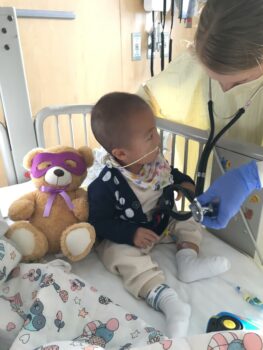
Ming – Pediatric Leukemia Adoptive Therapy (PLAT-02) clinical trial
Ming’s mom and dad were told that their son had leukemia at just 92 days old. They immediately started researching CAR T-cell immunotherapy and looking for institutions around the world that were enrolling young children into their clinical trials for high-risk cancers like Ming’s.
The family traveled nearly 6,000 miles from Suzhou, a city in the southeastern edge of Jiangsu Province in eastern China, to Seattle for the Pediatric Leukemia Adoptive Therapy (PLAT-02) immunotherapy trial, an experimental new cancer treatment that stimulates the immune system to fight disease.
“When we came to Seattle Children’s for treatment, we found that the doctors and nurses were very professional, patient and very warm,” recalled Ming’s mom, Suxi. “We left our efforts to good hospitals and ourselves, and the rest to God.”
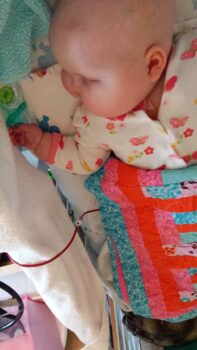
Greta – Pediatric Leukemia Adoptive Therapy (PLAT-02) clinical trial
When the parents of baby Greta discovered that she had leukemia, they were devastated. Before reaching her first birthday, Greta had already undergone chemotherapy and a bone marrow transplant in the family’s hometown of Portland, Ore.
Greta’s cancer returned only a short five months later, and the family left no stone unturned researching other ways to save their child.
After learning about an immunotherapy clinical trial at Seattle Children’s and many crucial discussions with Dr. Rebecca Gardner, Seattle Children’s former Medical Director of Immunotherapy and Interim Chief Medical Officer of Seattle Children’s Therapeutics, they dropped everything to enroll.
“The other immunotherapy trials that were going on weren’t accepting babies,” shared Greta’s mom, Maggie. “When Seattle Children’s opened that trial, Greta had relapsed maybe one month later, so if it hadn’t opened, she wouldn’t be here today – she just wouldn’t.”
Living and loving life after cancer immunotherapy
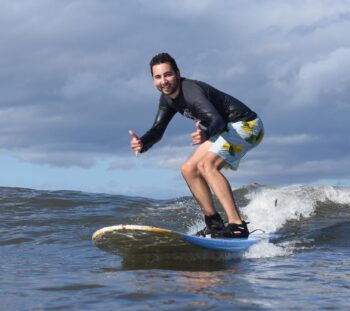
Today, Jedd is a 20-year-old sophomore in college who is five years cancer-free and in long-term remission.
The Central Washington University student is looking at a potential career in the medical field and spends his summers in the San Juan Islands kayaking and camping.
“Honestly, without the therapy, I don’t think I would even be here,” said Jedd. “That ultimately saved my life and now I am able to do all of these things because I’m cured.”
When he talks to people about his time at Seattle Children’s, they are often stunned to hear about innovative treatments like T-cell immunotherapy and the important role these trials and research plays in finding a potential cure for childhood cancer.
“The whole science is mind-blowing,” he added. “People usually just think of chemotherapy and radiation, so when you explain all these new treatments that are being used, they are shocked and want to learn more. As we go on, the treatment for the T-cell therapy will get even better and better.”

A piece of advice he shares with other kids and families going through what he did is to trust your doctor and never give up.
“Keep pushing through. You’ve got to believe, stay positive and keep going.”
Today, Ming is a happy and bright second grader who enjoys playing basketball, building with Legos and learning level two piano. He is in long-term remission, now nearly eight years cancer-free.
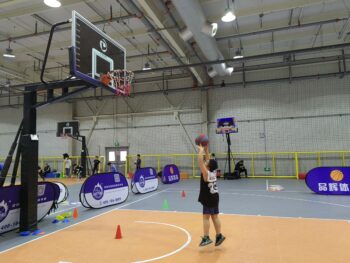
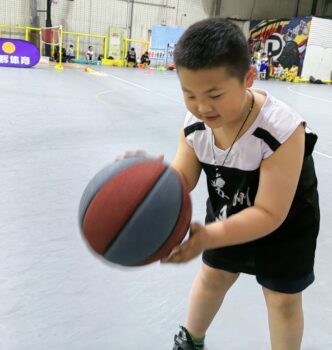
“Seattle Children’s saved my child and my family, and I can’t imagine life without him,” shared Suxi. “Before arriving at Seattle Children’s, our treatment process was very painful. Today, Ming has a normal life, completely like an ordinary child. Seattle Children’s gave him a new life.”
While undergoing the T-cell immunotherapy treatment, Ming was also given a teddy bear as encouragement, which he still sleeps with to this day.
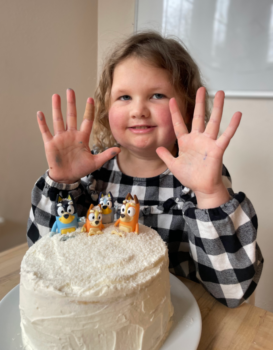
Today, Greta is a joyful fourth-grade student who recently celebrated her 10th birthday and nearly a decade cancer-free. She loves riding horses, cuddling with stuffed animals, eating sushi and playing the violin.
“In general, she is a healthy kid,” explained Maggie. “I just went on a field trip with her class, and you wouldn’t be able to pick the cancer survivor out of a lineup. She looks like a normal kid.”
Even though Greta’s journey battling cancer was tough, Maggie said it was the T-cell immunotherapy treatment that was remarkably the least difficult, with side effects resembling a severe cold or mild flu.
“She had been through a transplant with her sister’s bone marrow, which is rarely an easy experience for anyone, but of all of her treatments, even chemotherapy, this was the easiest,” said Maggie. “She was infused with the T cells, then had a fever for a couple of days, and then they told us she was in remission and that we could go home.”
After spending nearly nine months at Seattle Children’s, Maggie said it feels like a second home. She encourages any families going through a similar experience to take things one day at a time and to find a support group to lean on.
“When you are a cancer parent, you have to pull so much strength just to walk through your day. I hope families can read this and have hope. This is worth fighting for and fighting through.”
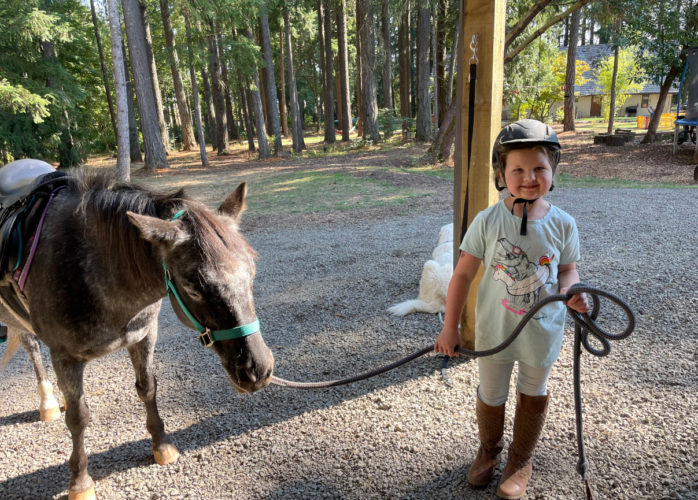
Paving a path to cures with continued research and treatment
Data from Seattle Children’s Therapeutics PLAT-02 trial helped lead to the U.S. Food and Drug Administration’s (FDA) approval of a gene therapy for certain types of non-Hodgkin lymphoma.
“Every child who will face cancer deserves a therapy that provides a cure while leaving their bodies, minds, and spirits unharmed and their futures full of promise,” said Dr. Michael Jensen, vice president of Seattle Children’s Therapeutics and Chief Therapeutics Officer. “T-cell immunotherapy is paving the way to become the next great advancement in cancer treatment and continues to offer new hope to help kids like Jedd, Greta and Ming live the healthiest and most fulfilling lives possible.”
Seattle Children’s progress in immunotherapy is unrivaled by any other pediatric medical center. But, for the thousands of families worldwide who will learn their child has cancer this year, this work cannot move fast enough.
Tremendous donor support has been a catalyst to accelerate immunotherapy milestones at Seattle Children’s and allows us to leave no stone unturned in the search for cures. Learn how to support this research here.
Resources:
- Seattle Children’s Therapeutics (seattlechildrens.org)
- Seattle Children’s Research Division (seattlechildrens.org)
- Cancer and Blood Disorders Center – Seattle Children’s (seattlechildrens.org)
- Pediatric Clinical Trials | Seattle Children’s Hospital (seattlechildrens.org)
- CAR T-Cell Immunotherapy for Leukemia and Lymphoma (PLAT) (seattlechildrens.org)
- Cancer Research at Seattle Children’s Contributes to FDA Approval of CAR T-Cell Immunotherapy Treatment for Adults with Relapsed or Refractory Large B-Cell Lymphoma
- Contact Seattle Children’s Foundation and Guild Association

